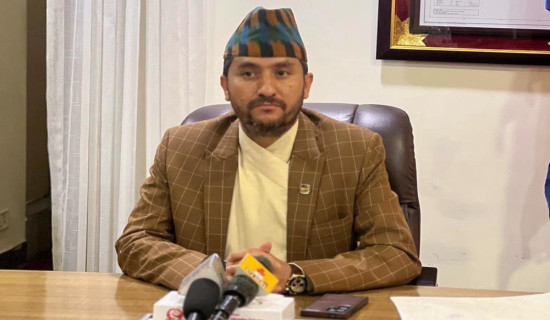- Thursday, 15 January 2026
Unforgettable Soviet Memories
Literature, in essence, is accessible to all. In recent times, Nepali literature has experienced remarkable expansion, with a diverse influx of contributors from various professional fields. There are quite a lot of economists, historians, and science scholars who have written books of literature and earned recognition as litterateurs. Even engineers and doctors are increasingly involved in contributing to the Nepali literature.
However, the author here is Ram Bindu Shrestha, an engineer, and the under-review literary work entitled “Mera Soviet Samjhanaharu” from him is a memoir. In fact, whether it is in their homeland or elsewhere, the places of study for students always occupy a sacred space in their hearts. It seems author Ram Bindu, too, might have brimmed with sentimental thoughts and optimism to produce this kind of literary book. So, “My Soviet Memories” can be taken as the result of the deep literary inclination of the author.
The author emphasises another influential factor in shaping this book: his practice of maintaining a diary during his study period in Russia should also be recalled. We keep hearing that diary writing is a good habit, and elders and scholars wish to advise students to improve their writing skills. We, thus, can take “Mera Soviet Samjhanaharu” as a good example of the author’s satisfaction and benefit of diary writing.
This 252-page book contains layers of memories, both of Nepal and Russia. Ram Bindu is a youth of Baglung District, and he achieved impressive successes in school education from there. So, descriptions of Baglung’s natural beauty, the competitive spirit that he developed there while participating in extracurricular activities, and his impressions of the capital city of Kathmandu after arriving here for further studies beautifully figure at the beginning of this book.
However, the prominent point, as the title suggests, for the author is his impressions about Russia. Is it interesting? To a Baglung youth, going to Russia to become an engineer and coming back to serve the nation is a dream. Ram Bindu, as stated in his book, considers it more than a dream.
In fact, the sea change happened in Russia then, and he witnessed all these things and noted them in his diary for writing purposes. When he reached there, the nation was the USSR, the superpower, and then came a phase where disintegration became a compulsion and separate existences of nations emerged out of the same USSR. Indeed, this separation has causes; the author has talked about it in the book. But can even a valid reason satisfy the pain of separation? Ram Bindu sees this question in the mirror of literature and tries to feel the pain of disintegration from the perspective of sentiment. In fact, it seems, jargon like the ‘Glasnost’ and the ‘Perestroika’, too, are quite technical in answering the question of sentiments.
Being a book of travel memories, there are lots of things to read about from the author’s tour of the Russian states and the European countries.
The countries and places he toured and shared memories of vacation times while studying in Russia in the ‘Soviet Samjhanaharu’ are Moscow, Yerevan, Kharkov, Baku, Tula (renowned author Tolstoy’s birthplace), and countries like Germany, Turkey, Bulgaria, France, Spain, Switzerland, etc. One thing that must not be forgotten in his tour description is that he has artistically mixed his sentimental outpourings about the beauty of motherland Nepal in his travel writings in this book.
Similarly, the book is enriched with a description of the author’s educational experience in Russia. He writes, ‘the respect and dignity of the Soviet educational system remained unchanged even when other sectors became unstable in that period’ (page 170 in the book). One more interesting thing Ram Bindu has mentioned about education is on page 119: ‘In the beginning, we found no logic as to why Russians are prescribing philosophy courses to students of engineering faculties. But we are now realising that this subject is the basis for the empowerment of mental activities.’
To sum up the “Soviet Memories” of the author, the outlook Ram Bindu has maintained from the beginning page to the end is optimism and positivity.
This means the author values it as a matter of paramount importance. He also suggests to readers that no one is perfect, and one may be good in one area of study, but another may be good in another subject, but these gaps can be bridged with the help of a positive outlook.
In the end, the preface author Chandra Kanta Acharya’s remark about the book is: ‘The description in the vacation trips of the author at the end of each exam in this book seems to be like stories for all those who have studied in Russia.’
(Kafle is a former Deputy Executive Editor of this daily.)

















